
Egyptian President Abdel Fattah El-Sisi speaks in a press conference with his Turkish counterpart, Recep Tayyip Erdogan, in Ankara, 4 September 2024 - Egyptian Presidency
CAIRO – 5 September 2024: On Wednesday, Egypt’s President Abdel Fattah El-Sisi made his first visit to Türkiye since taking office in 2014, where he met with President Recep Tayyip Erdoğan, agreeing to bolster their coordination amidst an increasingly turbulent regional situation.
Discussions between the two presidents have covered enhancing cooperation between Egypt and Türkiye in various fields, especially trade. They also sent a unified call for an immediate ceasefire in Gaza and settlement of regional conflicts.
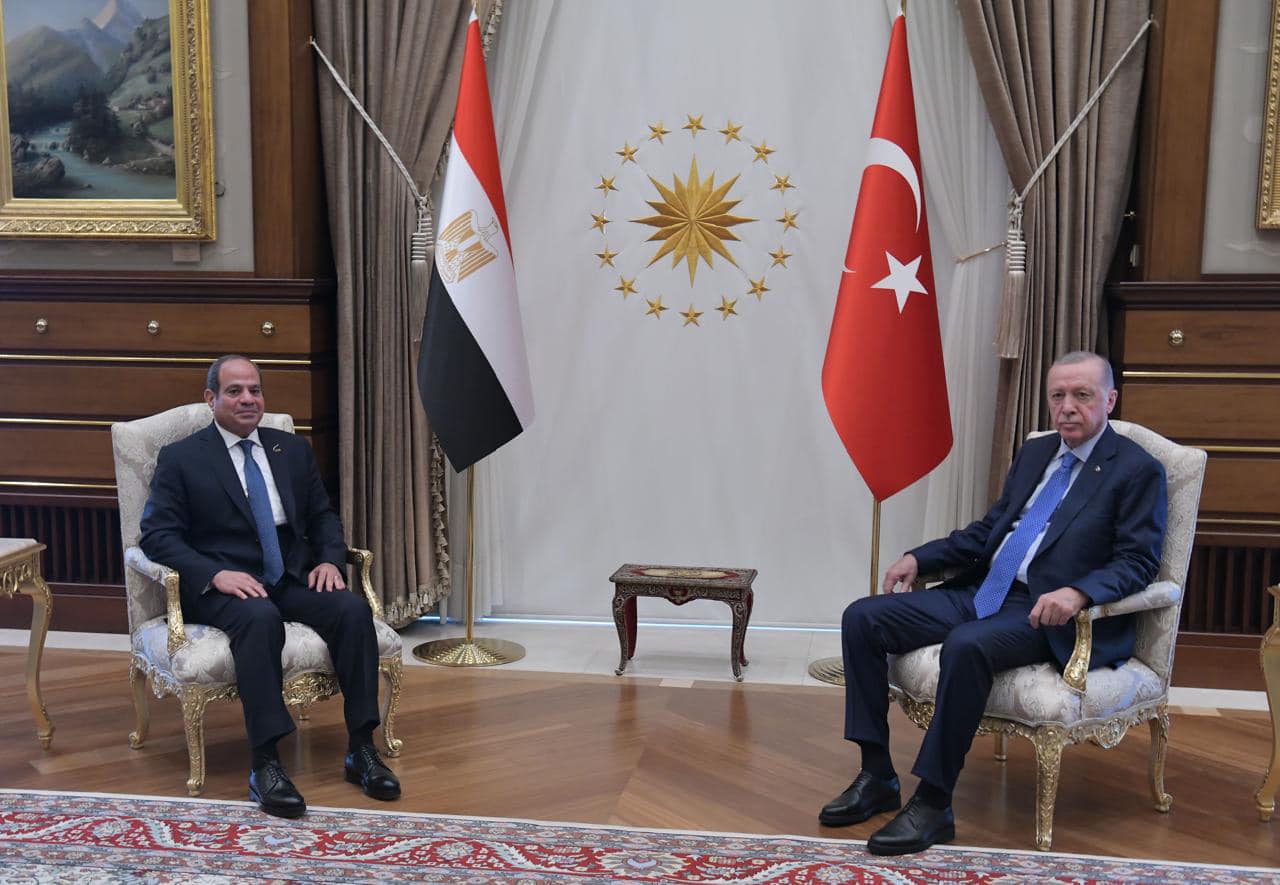
Boosting trade to $15 billion
In a press conference in Ankara, Sisi and Erdoğan emphasized the importance of increasing trade to $15 billion in the coming years, in addition to enhancing joint investments between the two countries.
“We are decisively making progress toward our goal of boosting our trade volume to $15 billion within the next five years,” Erdoğan said.
Meanwhile, Sisi affirmed granting possible facilitations to the Turkish businessmen, in light of the distinct investment climate in Egypt.
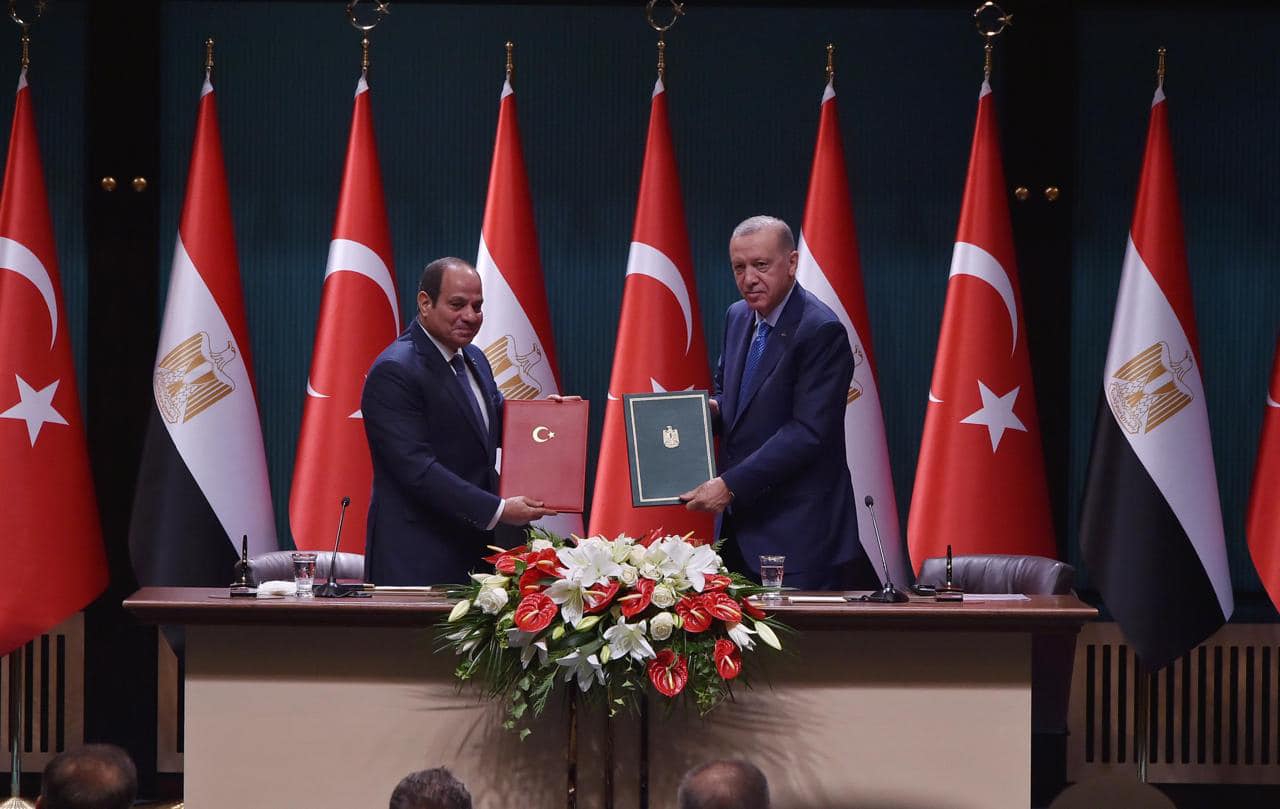
Immediate Gaza ceasefire
Sisi and Erdoğan discussed ways to coordinate their efforts to address the regional crises, primarily the dire humanitarian catastrophe endured by the Palestinian people in Gaza, in an unprecedented tragedy that has been ongoing for nearly a year.
Sisi said, “I would like to underscore the shared and unified stance of both Egypt and Türkiye regarding the demand for an immediate and urgent ceasefire.”
He also affirmed both countries’ rejection of the current Israeli escalation in the West Bank and call for launching a process that shall fulfil the aspirations of the Palestinian people to establish their independent state, along the June 4, 1967 borders, with East Jerusalem as its capital, in accordance with the relevant resolutions of international legitimacy.
The Egyptian president underlined the two countries’ constant cooperation since the outbreak of the crisis to deliver humanitarian aid and relief into Gaza, despite the intransigent impediments imposed by Israel.
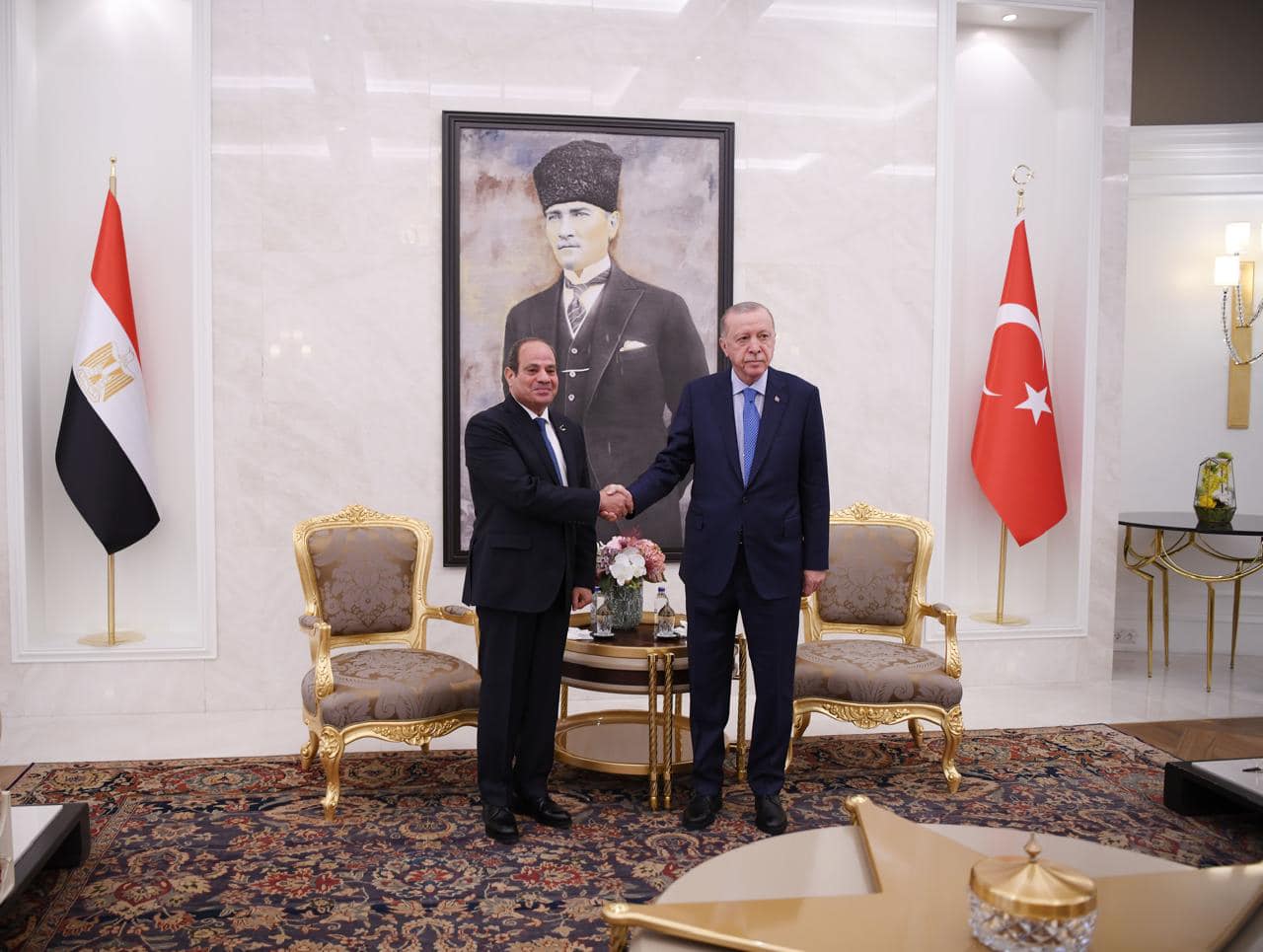
Erdoğan stated that the situation in Palestine was the epicenter of his meeting with Sisi.
“The termination of the genocide that has been going on for 11 months, the immediate establishment of a permanent ceasefire, and the unimpeded flow of humanitarian aid continue to be our priorities,” Erdoğan stressed.
He commended cooperation between the Egyptian and Turkish authorities to deliver aid to Gaza, stating that 32 percent of the total aid dispatched to Gaze have originated from Türkiye.
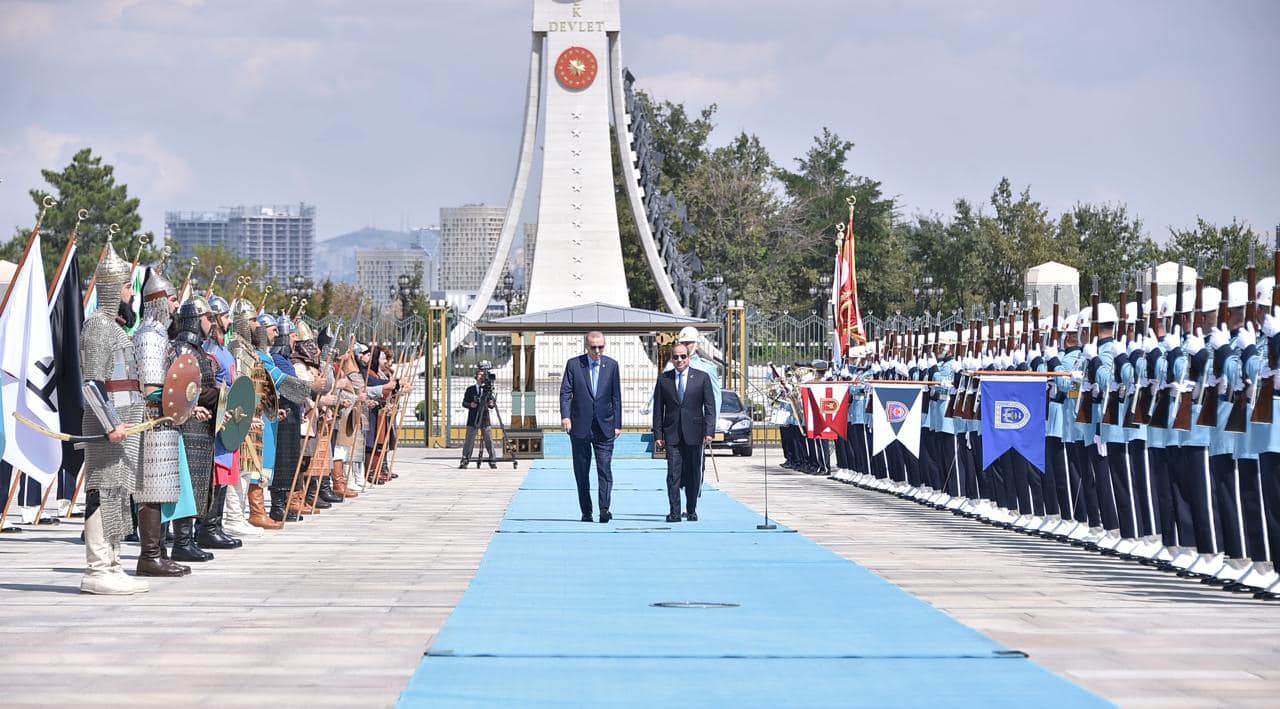
Responsibility for Gaza crimes
Erdoğan condemned Israel for blocking the delivery of humanitarian aid to those in need in Gaza.
He highlighted Israeli crimes in Gaza over the past 11 months, dropping “thousands of tons of bombs” and condemning the Palestinian people to hunger and thirst.
The Turkish president held “Israel and its backers … responsible for every innocent person who dies from hunger, thirst, or lack of medicine.”
Erdoğan stressed that some countries have become an accomplice in the Israeli crimes through their unconditional support to Israel.
He warned that failure to take deterrent steps to stop the Israeli government’s policies put the region, and even the entire world, at risk.
“Preventing Israel from dragging our region into further tension will only be possible by abandoning ambivalent policies,” Erdoğan said.
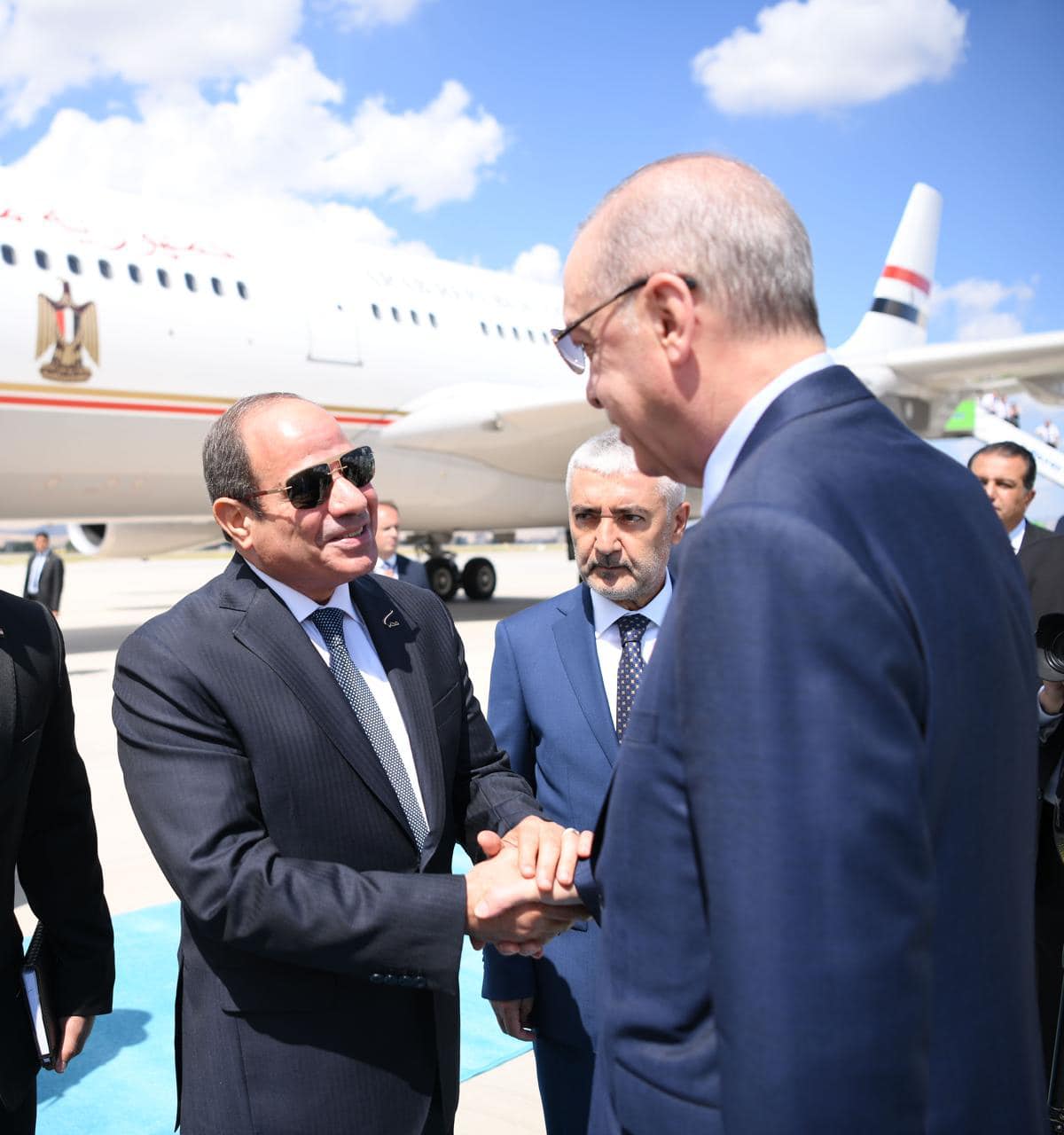
Supporting Egypt-Qatar-US mediation
Erdoğan emphasized Türkiye’s support to the mediating role played by Egypt, Qatar and the United States to end the Israeli aggression.
He stated that Türkiye is supporting these efforts through their foreign ministry and the National Intelligence Organization (MİT), describing Israel’s stance as being “uncompromising and obstructive.”
“We have done and continue to do whatever we can to step up the pressure on Israel,” Erdoğan said.
He voiced rejection of Israeli Prime Minister Benjamin Netanyahu's allegations against Egypt.
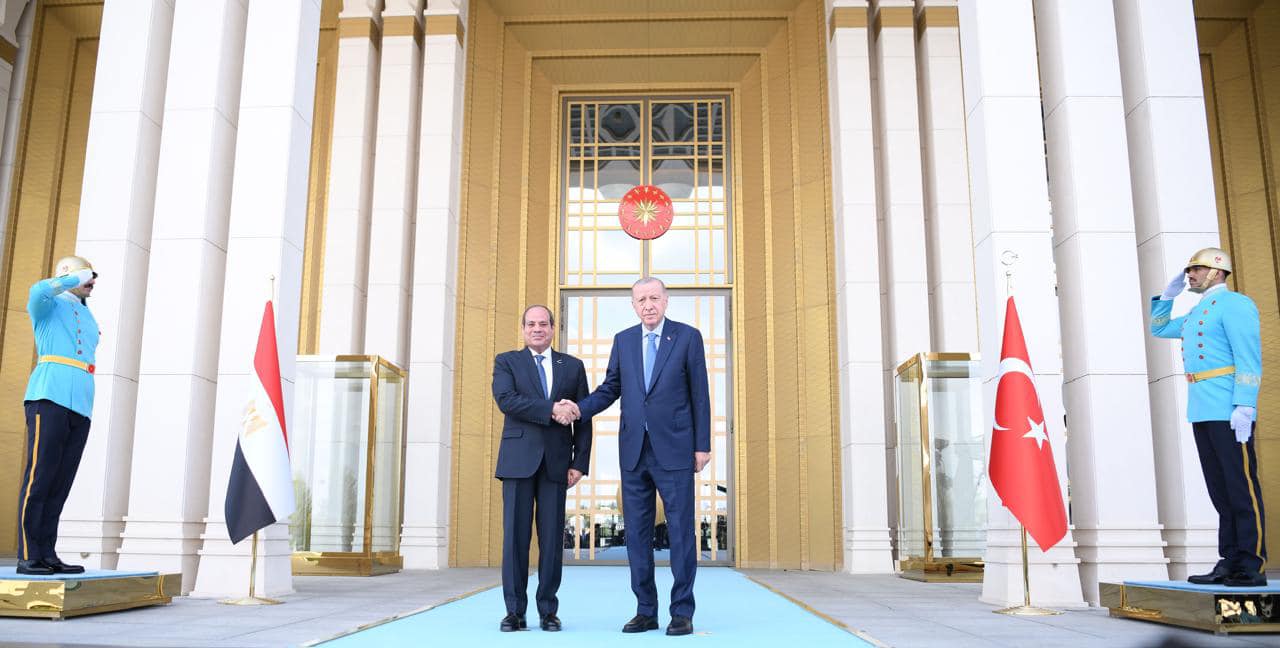
Ending Israeli occupation
During his visit, Sisi co-chaired the first meeting of the High-Level Strategic Cooperation Council between Egypt and Türkiye, along with Erdoğan, expressing further condemnation of Israeli practices in the Palestinian territory.
The council reiterated both countries’ unwavering support for the call to end the Israeli occupation of the Palestinian territory.
It highlighted the legitimate right of the Palestinian people to establish their independent, sovereign and contiguous state based on the 4th of June 1967 lines, with East Jerusalem as its capital.
The two countries highlighted the need for protecting the right of return for all Palestinian refugees, inviting the countries that have not yet recognized the State of Palestine to take swift actions towards this end.
They also stressed the importance of achieving intra-Palestinian unity at the current stage of the Palestinian cause.
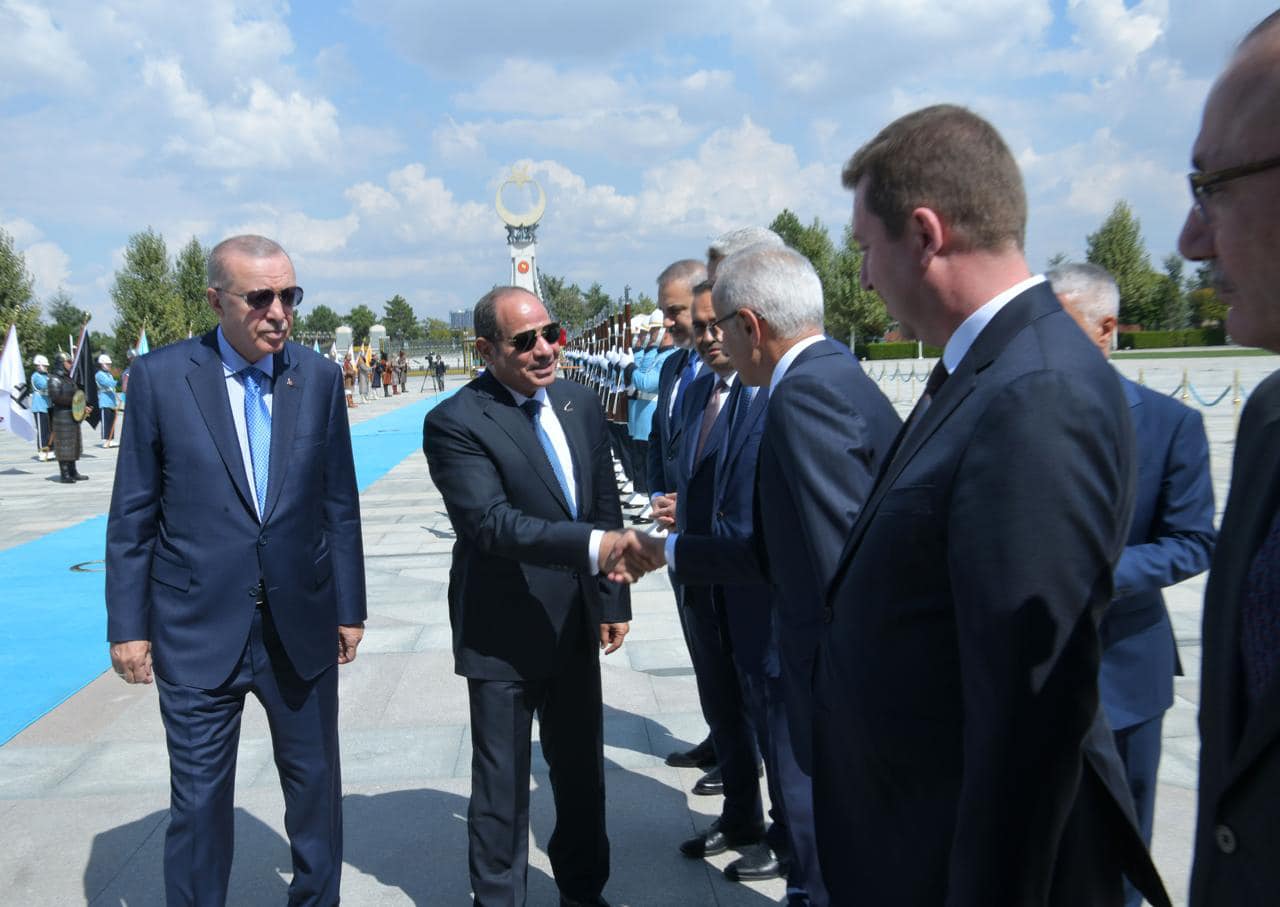
On Gaza, the council called for an immediate and permanent ceasefire, the release of captives and detainees, and the uninterrupted and unimpeded flow of humanitarian and medical aid into Gaza and throughout the strip within the framework of UN Security Council resolutions.
The two countries also called for strong solidarity for the reconstruction of Gaza, as well as the urgent restoration of peace in the region in order to prevent further escalation.
On the West Bank, they condemned Israeli settlement activities, settler violence, as well as pertinent escalatory and inflammatory rhetoric.
They called upon the international community to support the Palestinian National Authority’s efforts in facing and lifting Israeli restrictions as well as illegal policies and practices.
The council also called for empowering the Palestinian National Authority to fulfill its duties and responsibilities towards the Palestinian people in Gaza and the West Bank including East Jerusalem.
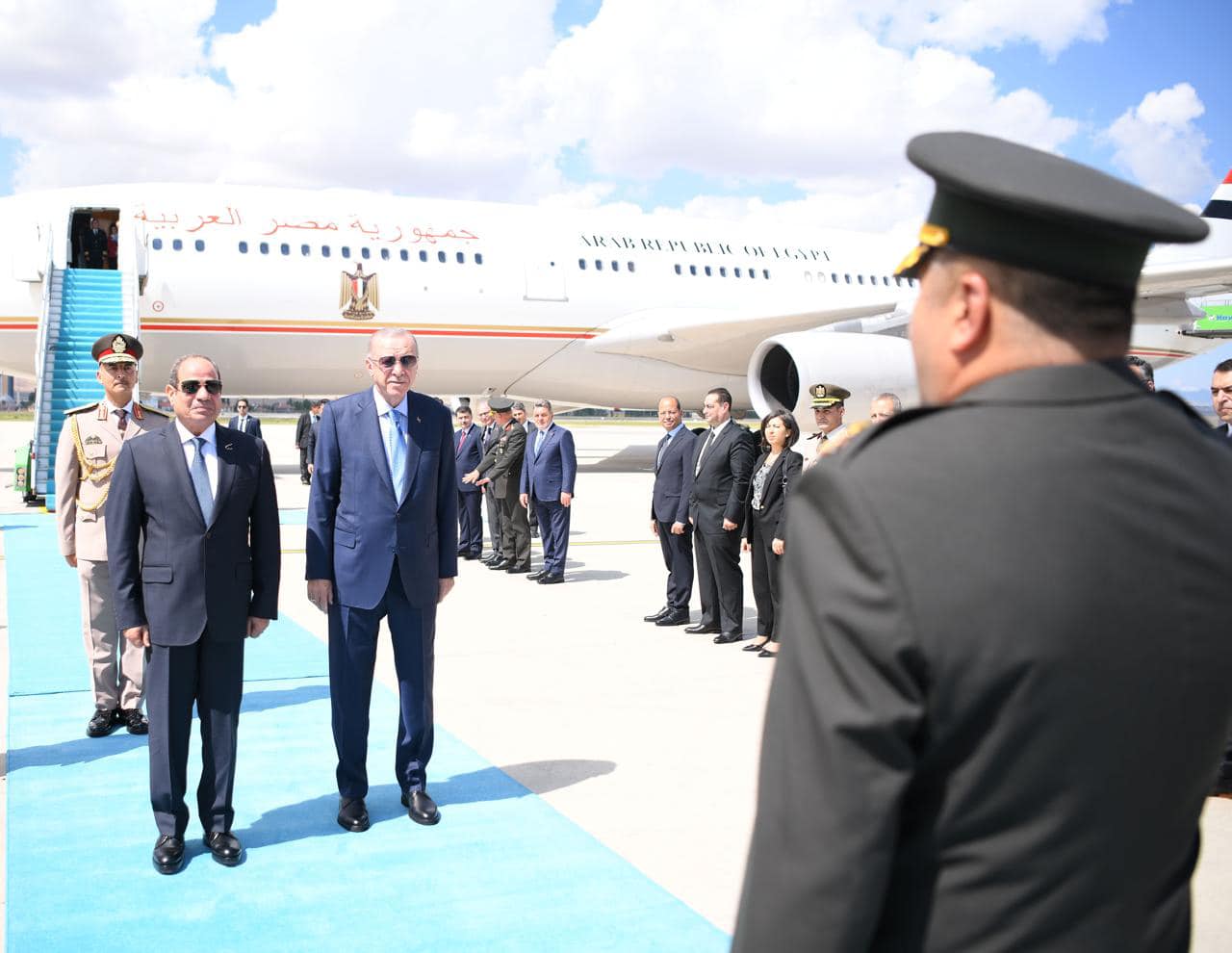
De-escalating regional crises
The two presidents underlined their keenness to enhance their coordination on regional issues, including the Eastern Mediterranean, Syria, Libya, Sudan and the Horn of Africa.
Sisi confirmed looking forward to continuing the current state of de-escalation in the Eastern Mediterranean and to building upon it to reach a settlement of the existing disputes among the region’s coastal states.
“This shall enable us to cooperate and leverage the region’s natural resources for the prosperity of all our peoples,” Sisi said.
The presidents also discussed the situation in Syria, emphasizing their commitment to finding a solution to this crisis.
“We welcome, here, the efforts of rapprochement between Türkiye and Syria, as we ultimately aim to achieve a political solution and alleviate the suffering of the brotherly Syrian people, in line with the UN Security Council resolution on the matter, while maintaining the unity, sovereignty and territorial integrity of the Syrian State and eradicating terrorism,” Sisi said.
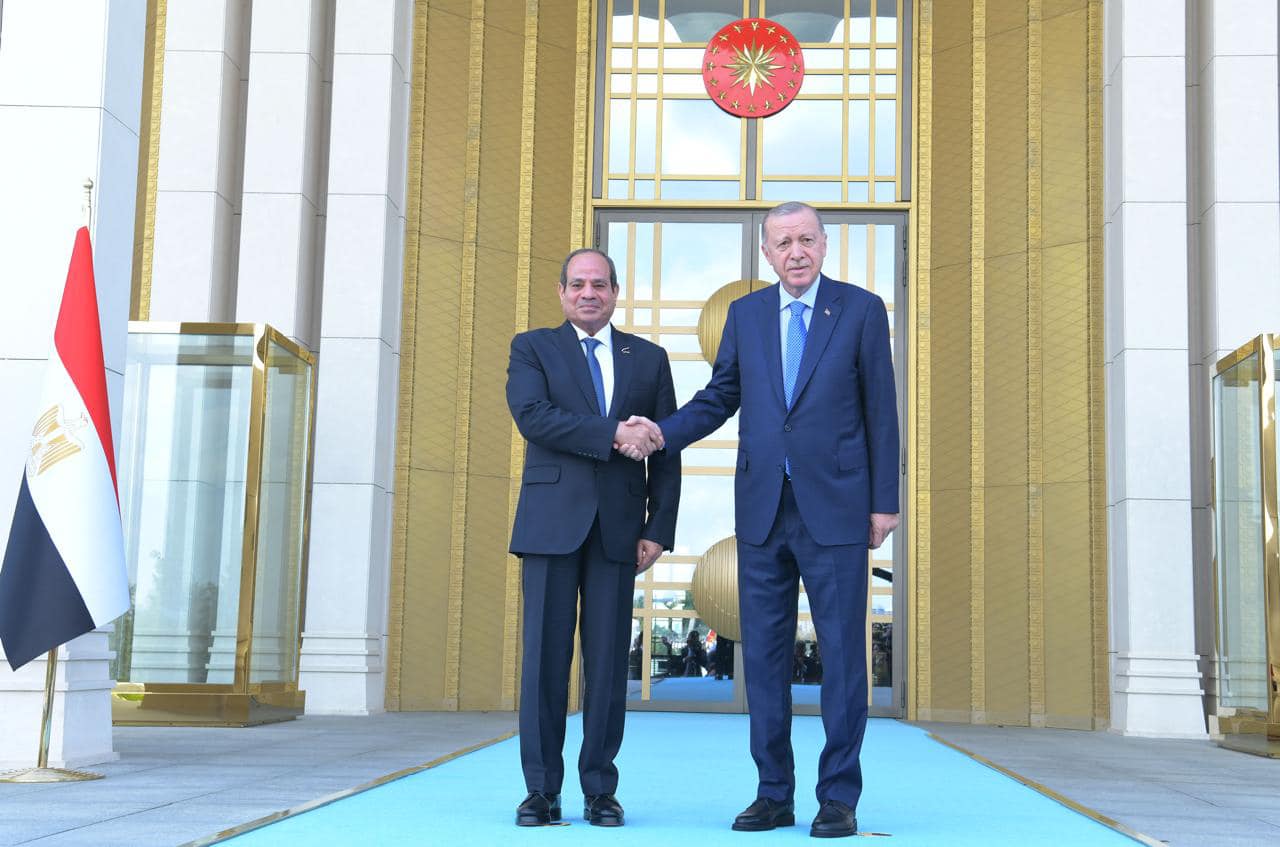
On Libya, Sisi said he and Erdoğan agreed to consult among their institutions in order to achieve security and political stability in Libya.
“We reiterated the need to close the chapter on this protracted crisis by holding simultaneous presidential and legislative elections, withdrawing illegitimate foreign forces and mercenaries from the country, and ending the phenomenon of armed militias, thus enabling Libya to overcome division and achieve lasting security and stability,” Sisi said.
The two countries confirmed their will to support a Libyan owned and Libyan led political process under the facilitation of the United Nations with the aim of preserving Libyan security, stability, sovereignty, territorial integrity and political unity.
They also discussed Egypt’s efforts, in collaboration with various parties, to achieve ceasefire in Sudan and promote a political solution to the Sudanese crisis.
Moreover, they had a thorough discussion on the situation in the Horn of Africa, notably Somalia, and agreed on the crucial need to preserve the unity, sovereignty and territorial integrity of Somalia in the face of existing threats.
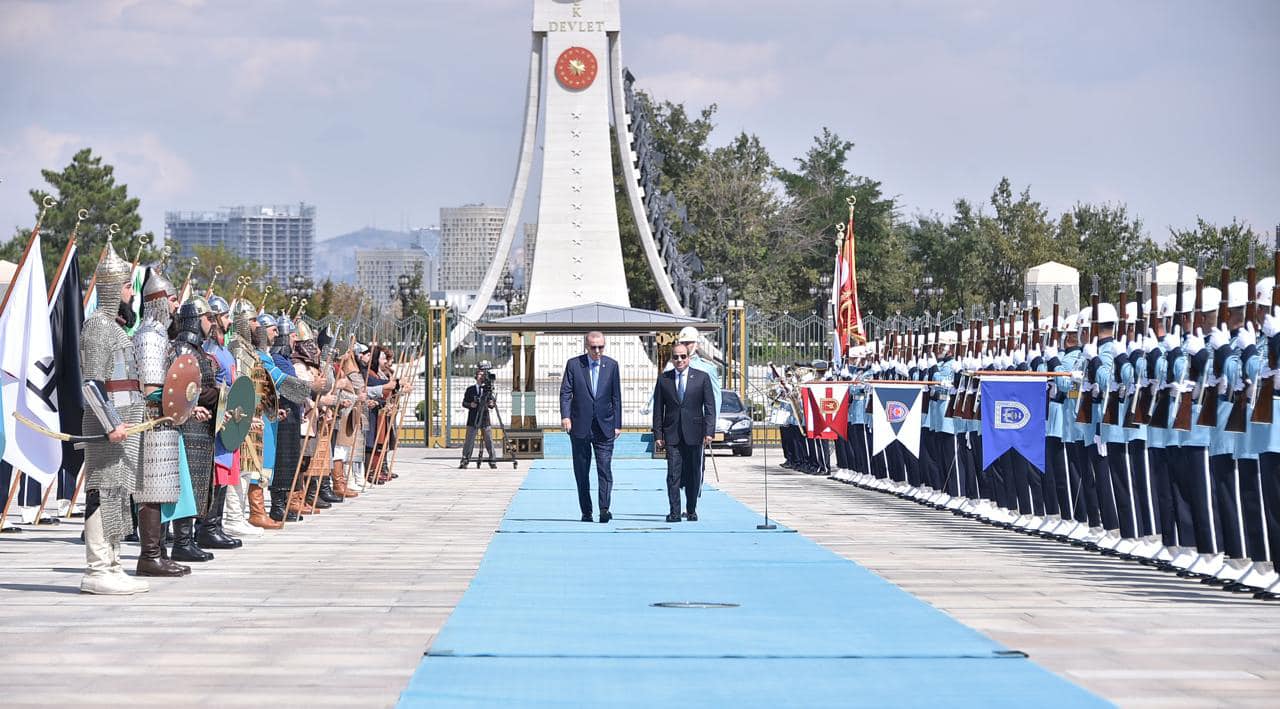
First High-Level Strategic Cooperation Council meeting
The council meeting, chaired by the two leaders yesterday, aims to bring about a significant leap across all fields, mainly: trade, investment, tourism, transportation, and agriculture.
A joint declaration of the meeting highlighted memoranda of understanding (MoUs) signed by both countries during the president’s visit in the fields of finance, environment, urbanization, health, energy, enterprise, agriculture, civil aviation, information and communication technologies, higher education, labor and employment, cooperation and capacity building, railways, competition policy, and cooperation between diplomacy academies.
Both countries agreed to continue improving the investment climate for businessmen of their respective countries and to take, in this regard, necessary measures to eliminate problems of investors and companies on each side and to encourage new investments.
They reiterated their willingness to promote Foreign Direct Investment (FDI) and express their willingness to strengthen their cooperation in the fields of industry and infrastructure.
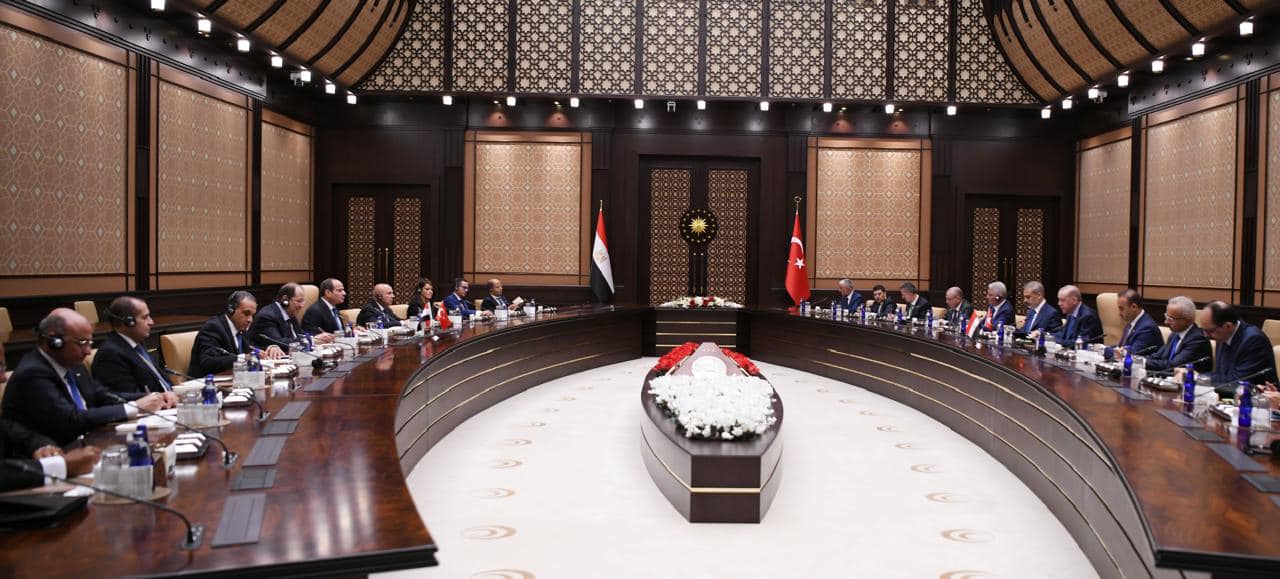
They expressed their commitment to promote and increase joint economic projects and mutual investment opportunities in all fields with a view to achieving integration in terms of production, consumption as well as exportation to third countries in Africa, Europe and other parts of the world.
They reaffirmed their willingness to continue political and diplomatic dialogue between the two countries, and to broaden the scale of consultations in different fields such as military, security, and consular affairs.
The two countries underlined the importance of maintaining close cooperation in the field of energy as well as in environmental affairs.
They will also work on supporting bilateral cooperation in the field of civil aviation and encouraging relevant authorities to facilitate procedures for airline operations and increase the number of flights.
Additionally, they agreed to further strengthen their cooperation in the fields of tourism, culture, education, youth and sport, media, combating disinformation, health, and transport.
They also underlined the importance of their cooperation in counterterrorism efforts and in combating transnational organized crime.
Comments
Leave a Comment